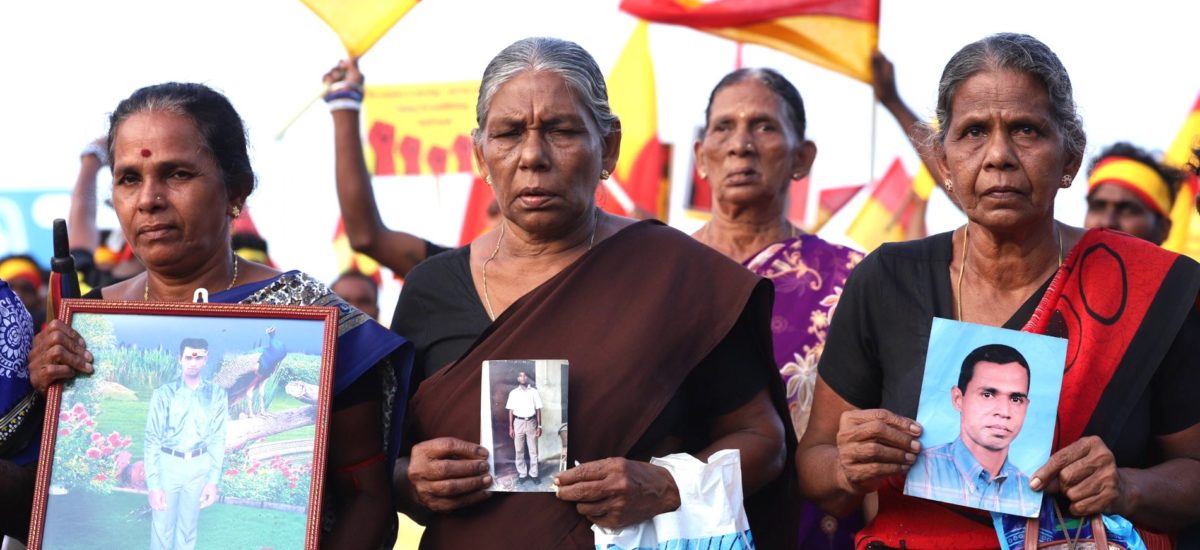Photo courtesy of Kumanan
Veteran human rights campaigner Reverend Marimuthu Shakthivel’s voice is tinged with frustration when he says, “There will come a day where we will see the end of our struggle for the rights of the forcibly disappeared.”
As the coordinator of The National Movement for the Release of Political Prisoners, Reverend Shakthivel has been at the forefront of the campaign for the families of the disappeared. He is seen as a figure of hope but his words reveal a sense of impending doom. Almost fourteen years on from the end of the war, Reverend Shaktivel has noticed a growing apathy towards the quest for justice as the energies of the older generation fade.
Campaigning families across the country face a generational transition and the unending efforts have taken their toll.
“In the search for my son, I had to go to many places. For that I sold all our properties and jewellery. We do not have money to go to the protests anymore,” says Yogarthi Alfred, holding back the tears as she recalls how the past years have devastated her family. “I was a preschool teacher. I left my job to go searching for my child. This became my profession.”
In 2008 Yogarthi’s eldest son, Dinu, disappeared while collecting drinking water in Mullaitivu. He was only 16 years old at that time. What followed was a chain of events that would define their lives.
Yogarthi and her mother spent the subsequent years attending protests across the country, sacrificing their health and finances. Yogarthi’s mother, who died campaigning, sold all her possessions to continue the search. Yogarthi has trodden a similar path as ancestral properties and valued possessions have slowly disappeared. Her family of five children now live in a small house in Mullaitivu. Wanting to move back to their native Jaffna, the Alfreds are stuck in limbo, living a hand to mouth existence by engaging in poultry farming, goat rearing and home gardening.
“If my brother were with us, we would not be here. We would have moved to Jaffna. Now we are waiting here until he returns. He knows only this place so we live here with the hope that he will return one day,” says Gobinza, Yogarthi’s 21 year old daughter.
A few kilometers away, another family grapples with the pressures of continuing the fight for justice.
“Only our elder sister is employed and she looks after the entire family so we do not have much money,” says 18 year old Nagaratinam Thamil Nila, the youngest of five children.
Nila’s elder brother disappeared during the final stages of the war in 2009. Her 50 year old mother, Parimaladevi, has campaigned ever since despite suffering from heart disease and other ailments that cause her to faint several times while on a march.
“My mother has become a sick person by participating in the struggle. We do not have money to buy her medication. Sometimes the neighbours buy medicine for her as a humanitarian gesture. After my brother disappeared, my mother has been searching for him. We wonder whether we will ever find him,” Nila says.
“If my son were alive today, I would not need to do manual jobs. Economic problems are the greatest impediment in our quest for justice,” says Parimaladevi.
Whereas the Alfreds still display an unflinching hope, Parimaladevi is more reticent about the future, having witnessed her family crumble under the strain of that day in 2009. “I think my children will not search for their brother after my death,” she says.
Across Mullaitivu District, the post war atmosphere is tense. What was once a peaceful region is now heavily militarized.
For trauma expert and academic, Christy Palendran, the telltale signs of war fatigue were visible in the new generation. “The reason why young people often shun the fight is due to severe shock and trauma. They are afraid that what happened to their parents will happen to them. I have met many young people like this who have become withdrawn due to the strain. There is a fear of being threatened, that intelligence officers will follow them.”
This climate of intimidation has created a hesitancy to act. Nila explains. “My mother does not like to take me to the protests because of the threats that intelligence officers and others pose to the younger generation. So we don’t participate in the protests.”
The sense of being watched is shared by the Alfred family. “Some people come and make inquiries claiming to be intelligence officers and speaking in a harsh tone. Due to this, we do not go to demonstrations,” says Jeyanthan Alfred, Yogarthi’s son.
Christy Balendran believes that these frustrations are connected to a wider stagnation that is beginning to penetrate the justice movement. “Incidents such as strangers taking photographs, threats and intimidation as well as economic difficulties are causing obstacles.”
“The fight for justice for the disappeared is continuing. But if it goes on like this, at a certain stage the campaign will fizzle out,” says Reverend Sakthivel. “We have no plan to take this quest to the next generation. One hundred and thirty parents have already died. These deaths are very discouraging and we are losing hope about taking the fight into the future.”
Human rights activist K. Kumanan is hopeful of a reinvigoration through alternative means. “It is the responsibility of the youngsters to take this to another level. They can make it globally known through digital platforms and by using art, documentaries and photographic exhibitions. The cause of disappeared persons is being brought to the attention of the world through these new channels. It is the younger generation who is responsible for this.”
“I am not afraid of threats from anybody and I am still prepared to participate in the effort,” says Nila.

